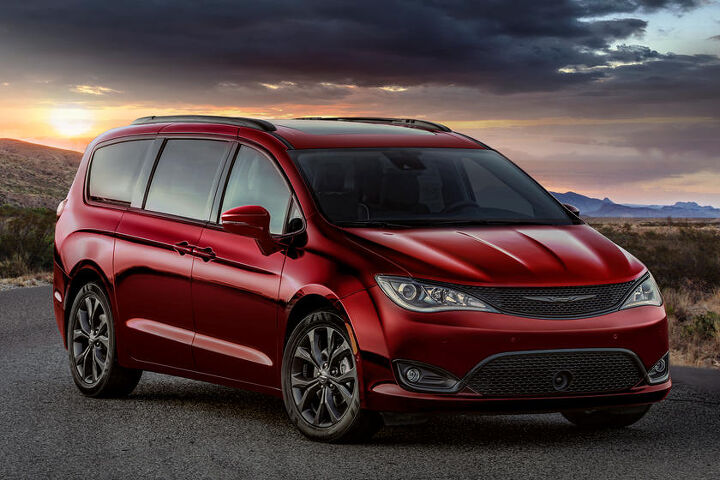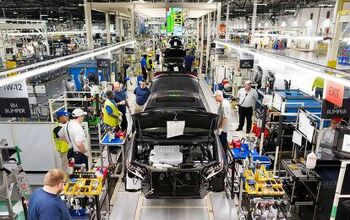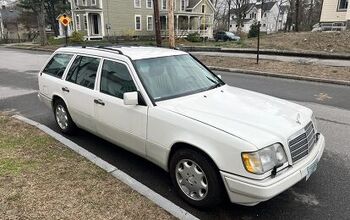Beleaguered Minivan Plant Granted a Reprieve

Home to the Dodge Grand Caravan, Chrysler Pacifica, and now the lower-tier Chrysler Voyager, Fiat Chrysler’s Windsor Assembly won’t see an expected shift cut next month. Instead, thanks to an uptick in volume, company brass has decided to ride out the year.
Originally scheduled to shed a shift (and along with it, about 1,500 jobs) at the end of September, Windsor Assembly will continue with its current workforce until at least New Year’s, Driving reports.
According to Unifor Local 444 president Dave Cassidy, who met Wednesday with FCA bigwigs, the sales picture isn’t as dire as it once appeared. “This is a good news story,” Cassidy said. “We live to fight another day.”
He added, “Sales are better. They have some numbers coming in for minivans that will allow us to maintain the third shift until at the end of the year.”
The announcement of a shift cut came in March, with FCA claiming the move aimed to align production with global demand. FCA employs about 6,100 workers at the minivan plant. In the face of the crossover explosion (some might call it an epidemic), minivans have taken a hit. Those which remain in the segment struggle for any sales headway, though most are on the decline.
While Cassidy welcomes the news, he cautioned that a new model — and not just the Voyager, a low-trim variant of the Pacifica — is needed to ensure the survival of the threatened shift. The uptick in sales covers both the Pacifica and Grand Caravan, he said, as well as fleet sales.
Thanks to FCA’s decision to move to quarterly sales reporting, we don’t know just how many Americans and Canucks sprung for a minivan last month. However, June showed U.S. Pacifica sales rising 10 percent, year over year. Grand Caravan sales were down 25 percent for the month.
In Canada, the opposite was true. Buyers of the old Dodge brought about a 14 percent uptick in the model’s sales, while Pacifica volume fell 18 percent. With the Voyager not yet on sale, it remains to be seen how the strategy of splitting a van into two models works for the brand.
[Images: Fiat Chrysler Automobiles]

More by Steph Willems
Latest Car Reviews
Read moreLatest Product Reviews
Read moreRecent Comments
- W Conrad I'm not afraid of them, but they aren't needed for everyone or everywhere. Long haul and highway driving sure, but in the city, nope.
- Jalop1991 In a manner similar to PHEV being the correct answer, I declare RPVs to be the correct answer here.We're doing it with certain aircraft; why not with cars on the ground, using hardware and tools like Telsa's "FSD" or GM's "SuperCruise" as the base?Take the local Uber driver out of the car, and put him in a professional centralized environment from where he drives me around. The system and the individual car can have awareness as well as gates, but he's responsible for the driving.Put the tech into my car, and let me buy it as needed. I need someone else to drive me home; hit the button and voila, I've hired a driver for the moment. I don't want to drive 11 hours to my vacation spot; hire the remote pilot for that. When I get there, I have my car and he's still at his normal location, piloting cars for other people.The system would allow for driver rest period, like what's required for truckers, so I might end up with multiple people driving me to the coast. I don't care. And they don't have to be physically with me, therefore they can be way cheaper.Charge taxi-type per-mile rates. For long drives, offer per-trip rates. Offer subscriptions, including miles/hours. Whatever.(And for grins, dress the remote pilots all as Johnnie.)Start this out with big rigs. Take the trucker away from the long haul driving, and let him be there for emergencies and the short haul parts of the trip.And in a manner similar to PHEVs being discredited, I fully expect to be razzed for this brilliant idea (not unlike how Alan Kay wasn't recognized until many many years later for his Dynabook vision).
- B-BodyBuick84 Not afraid of AV's as I highly doubt they will ever be %100 viable for our roads. Stop-and-go downtown city or rush hour highway traffic? I can see that, but otherwise there's simply too many variables. Bad weather conditions, faded road lines or markings, reflective surfaces with glare, etc. There's also the issue of cultural norms. About a decade ago there was actually an online test called 'The Morality Machine' one could do online where you were in control of an AV and choose what action to take when a crash was inevitable. I think something like 2.5 million people across the world participated? For example, do you hit and most likely kill the elderly couple strolling across the crosswalk or crash the vehicle into a cement barrier and almost certainly cause the death of the vehicle occupants? What if it's a parent and child? In N. America 98% of people choose to hit the elderly couple and save themselves while in Asia, the exact opposite happened where 98% choose to hit the parent and child. Why? Cultural differences. Asia puts a lot of emphasis on respecting their elderly while N. America has a culture of 'save/ protect the children'. Are these AV's going to respect that culture? Is a VW Jetta or Buick Envision AV going to have different programming depending on whether it's sold in Canada or Taiwan? how's that going to effect legislation and legal battles when a crash inevitibly does happen? These are the true barriers to mass AV adoption, and in the 10 years since that test came out, there has been zero answers or progress on this matter. So no, I'm not afraid of AV's simply because with the exception of a few specific situations, most avenues are going to prove to be a dead-end for automakers.
- Mike Bradley Autonomous cars were developed in Silicon Valley. For new products there, the standard business plan is to put a barely-functioning product on the market right away and wait for the early-adopter customers to find the flaws. That's exactly what's happened. Detroit's plan is pretty much the opposite, but Detroit isn't developing this product. That's why dealers, for instance, haven't been trained in the cars.
- Dartman https://apnews.com/article/artificial-intelligence-fighter-jets-air-force-6a1100c96a73ca9b7f41cbd6a2753fdaAutonomous/Ai is here now. The question is implementation and acceptance.



































Comments
Join the conversation
Just bought a '19 Pacifica Touring L+ last weekend. It was a demo model for a Chrysler executive around here, and has been in service since March. Old lady only drove is 2229 miles since March, and we got it for over $6k off sticker, when the best rebate we would have qualified for on a brand new one would have been about $3500 to 4000. Wife loves it so far.
So i actully own this car..i live in Arizona and i bought it from a solider in the military who had it imported and it has a clean Arizona title i drove it today for easter its for sale and runs great..i actually took my for sale add down last year and just reposted this week